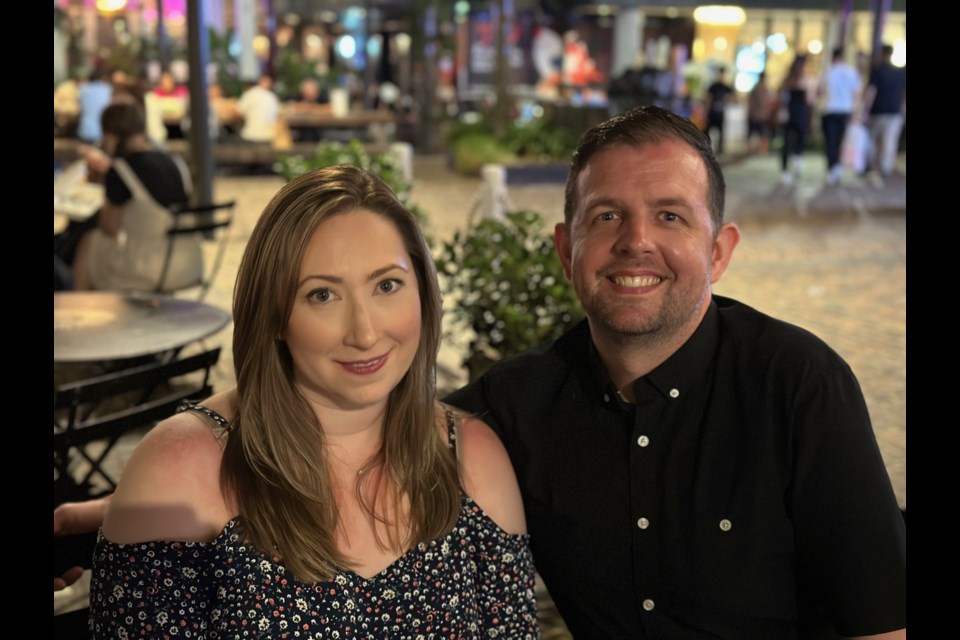Finding a compatible organ donor can be a tedious and challenging process, but experiencing the process twice is another story, according to a Richmond resident.
Rob Hammerschmidt was born with a congenital kidney disorder known as posterior urethral valves, where the urethra connecting the kidneys to the bladder is not fully developed, leading to urine not properly draining from the body.
Additionally, he was born premature and was consistently sick on top of having numerous surgeries as an infant.
At 23, Hammerschmidt's kidney function began to deteriorate. To help him avoid dialysis, his father donated a kidney to Hammerschmidt in 2009.
Nearly a decade after that transplant, his kidneys began to fail again.
“I was told that I only had a 1.7-per-cent chance of matching the population because of all the antibodies that built up from my rejection of the first transplant," he said.
"I am generally a positive person, but this news was difficult to swallow, knowing those slim odds."
By 2020, Hammerschmidt's kidney function had dropped to 15 per cent, requiring him to start dialysis.
He went to St. Paul's Hospital three times a week, four hours each time, a process he found terrifying especially during the COVID-19 pandemic.
"It's really scary during COVID-19, especially when you're already immuno-compromised and obviously being sick didn't help so it was very difficult," said Hammerschmidt.
The temporary treatment left him with migraines and fatigue after each visit.
He was then added to Canada's Highly Sensitized Patient (HSP) program list, an organ-sharing initiative designed to help patients find rare matches with donors across the country.
The HSP program, which began in 2013, is a collaboration between Canadian Blood Services, BC Transplant and other provincial donation and transplant programs and organizations to help "highly sensitized" patients.
"Highly sensitized" patients have exceptionally high antibody levels due to various reasons including blood transfusions, previous transplants or pregnancies.
These high antibody levels can cause the body to reject kidneys from most donors, making it difficult to find a suitable donor, according to BC Transplant.
Hammerschmidt told the Richmond News he trusted the doctors and medical professionals helping him at the hospital, but he had dwindling hope for a match.
"You hear stories of people on the (transplant) program waitlist for years and years so we never thought I'd get a call in January 2021 that I would have a match," he said.
"Without the HSP program, I'm sure that I would still be waiting for a transplant today."
About one in five people waiting for a kidney transplant are highly sensitized, according to Dr. Jag Gill, a transplant nephrologist at St. Paul's Hospital in Vancouver.
However, of these patients, fewer than one per cent can receive available organ donations because they are "hard to match," he added.
“We know highly sensitized candidates on the waitlist have a greater chance of becoming ill or dying while they wait," said Gill.
"By working together with all our donation and transplant partners, we are saving more lives.”
The HSP program recently reached one thousand kidney transplants, which includes 144 hard-to-match British Columbians like Hammerschmidt.
Since receiving his kidney transplant, Hammerschmidt has had two of the best bloodwork results of his life and feels "fantastic."
He recently travelled with his wife to Australia and is now enjoying camping and exploring the Oregon Coast.
"I'm pretty grateful every day. I was watching the sunset at the beach the other day and I just keep reflecting and couldn't believe this is what it is. It's the moments where you just think 'This is so beautiful,'" said Hammerschmidt.
"Definitely something I couldn't imagine doing if I was on dialysis right now."
For information on organ transplant, visit http://www.transplant.bc.ca
Got an opinion on this story or any others in Richmond? Send us a letter or email your thoughts or story tips to [email protected]. To stay updated on Richmond news, sign up for our daily headline newsletter. Words missing in article? Your adblocker might be preventing hyperlinked text from appearing.



